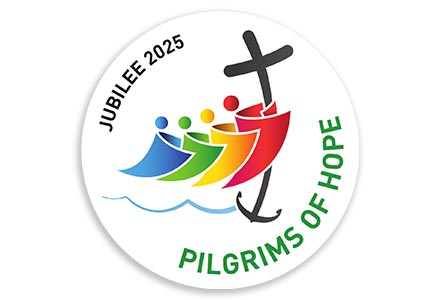A Jubilee of Hope
By Leo Almazan, PhD, HEC-C, Mission and Ministry
 The 2013 picture of Pope Francis washing the feet of 12 young people in an Italian detention facility went viral almost immediately after it was posted on the internet (Have you seen it?). The reason for that occurrence was simple, yet profoundly impactful: a Pope lovingly serving those consider the least in society stirred a feeling of jubilant hope in the minds and hearts of people around the world.
The 2013 picture of Pope Francis washing the feet of 12 young people in an Italian detention facility went viral almost immediately after it was posted on the internet (Have you seen it?). The reason for that occurrence was simple, yet profoundly impactful: a Pope lovingly serving those consider the least in society stirred a feeling of jubilant hope in the minds and hearts of people around the world.
Pope Francis’s actions allowed us to understand the place from which he called for a jubilee in 2024. In other words, he did not just ask us to do something when he declared 2025 to be a Jubilee of Hope year. Instead, he showed us through his actions what jubilee and hope look like and then invited us to enter into this celebration with open minds, full hearts and generous spirits. “Jubilee” and “hope” are two words that demand careful exploration.
On the one hand, the concept of hope, a theological virtue, indicates a deep desire for a future good, which is difficult, but possible to be attained, thanks to divine assistance. On the other hand, jubilee, a Jewish celebration, derives its name from the sound of the ram's horn (jobel, in Hebrew) that marks the beginning of a celebration. From jobel, Christians came up with jubilee. In the original Jewish tradition, a jubilee year happened every fifty years and consisted of letting the earth rest and freeing slaves.
 In line with the deeper meaning of both words, Pope Francis’ invitation to celebrate a Jubilee of Hope in 2025 begun with a clear acknowledgment of the harsh realities of life: devastated nature because of over-utilization and exploitation; human relations marred by domination and abuse; and a world state-of-affairs marked by unrest and strife. Additionally, all the related emotions that are elicited by these harsh realities are included in the celebration, such as fear, stress, anxiety, uncertainty, resentment and mistrust. At the same time, a true celebration of a jubilee of hope adamantly refuses to stay in the dark places mentioned above. Instead, it boldly declares our communal willingness to pause, pray, rest, reconcile, restore and recreate.
In line with the deeper meaning of both words, Pope Francis’ invitation to celebrate a Jubilee of Hope in 2025 begun with a clear acknowledgment of the harsh realities of life: devastated nature because of over-utilization and exploitation; human relations marred by domination and abuse; and a world state-of-affairs marked by unrest and strife. Additionally, all the related emotions that are elicited by these harsh realities are included in the celebration, such as fear, stress, anxiety, uncertainty, resentment and mistrust. At the same time, a true celebration of a jubilee of hope adamantly refuses to stay in the dark places mentioned above. Instead, it boldly declares our communal willingness to pause, pray, rest, reconcile, restore and recreate.
For some people, the latter description sounds “rosy”, “too idealistic” or even “impossible”. However, herein comes the “invoking divine assistance” part of hope. In other words, we invite God into the chaos we have created so that, just as God did with the original chaos (Gn. 1:2), God will bring order, beauty, harmony and new beginnings for all of us in the here and now.
Does this mean we just sit passively on the sidelines, expecting God to solve everything without our collaboration? Of course not. Celebrating a jubilee of hope means actively intensifying our life of prayer; proclaiming our faith and hope, especially when faced with recent tragedies such as floods, wars and general uncertainty; and translating them into concrete acts of charity. In the words of Pope Francis:
Here we see the reason why this hope perseveres in the midst of trials: founded on faith and nurtured by charity, it enables us to press forward in life. As Saint Augustine observes, ‘Whatever our state of life, we cannot live without these three dispositions of the soul, namely, to believe, to hope, and to love’
(Bull of Indiction of the Ordinary Jubilee of the Year 2025, May 9, 2024, n. 3)
It is in that same spirit that our present Pope, Leo XIV, has called us to be “seeds of peace and hope” and has challenged us to do so “by working with love and perseverance, [so that] we can sow many seeds of justice and thus contribute to the growth of peace and the renewal of hope.” (Message for the 10th World Day of Prayer for the Care of Creation 2025).
In brief, a jubilee of hope is not an external celebration. Instead, it is a call to transformation and conversion, a challenge to all of us to use our words and actions, filled with faith, hope and charity, to usher in a more just and peaceful world.

